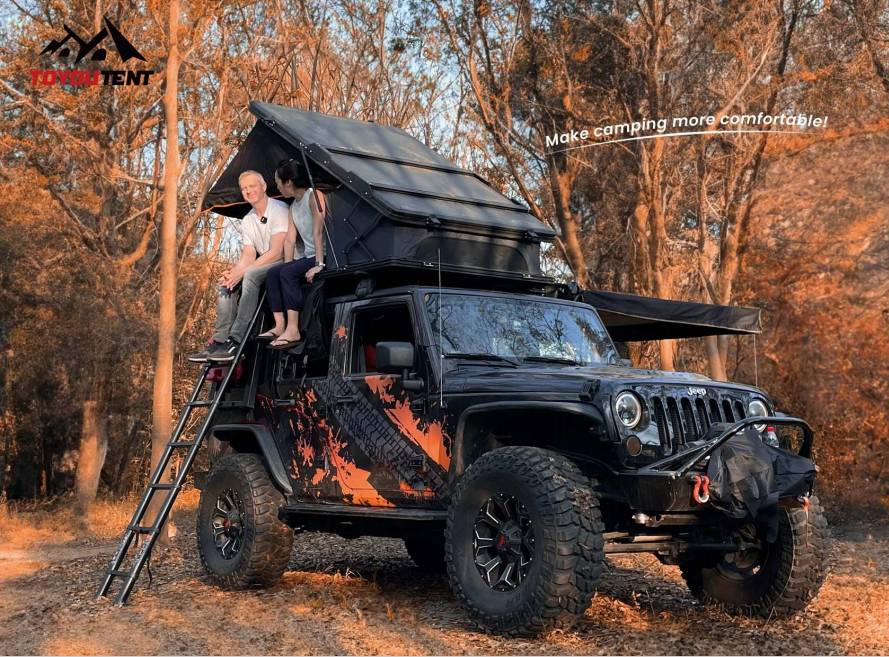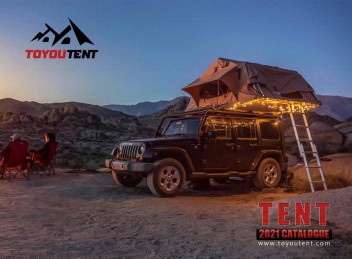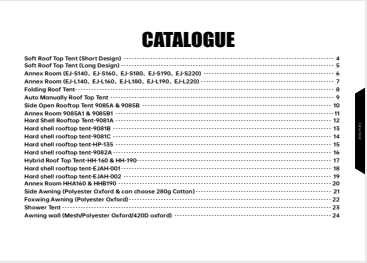Last summer, my best friend Mark embarked on a long-awaited road trip across the country. Excited yet anxious, he had everything meticulously planned out, except for one detail – accommodation. Traditional camping seemed impractical for his extensive travel plan, and hotel costs were too steep for his budget. Then, he stumbled upon the concept of rooftop tents – a game-changer that completely transformed his traveling experience.
Rooftop tents, offering the perfect fusion of convenience, comfort, and mobility, are an ingenious solution to on-the-go accommodation for travel enthusiasts. Unlike traditional ground tents, they install on your vehicle’s roof, providing a comfortable, safe and elevated sleeping area that’s off the ground and free from dampness, discomfort, or critters. As the popularity of rooftop tents continues to rise, an array of types and designs have emerged, each with its unique advantages, disadvantages, and best use scenarios. This article aims to help you navigate this vast selection, ensuring you can choose the perfect rooftop tent for your business.
What’re Rooftop Tents?
Rooftop tents, as the name suggests, are tents that mount on the roof of a vehicle. They have become popular due to their convenience, ease of setup, and the unique camping experience they offer. But not all rooftop tents are created equal. They come in various types, each offering its own set of advantages and disadvantages.
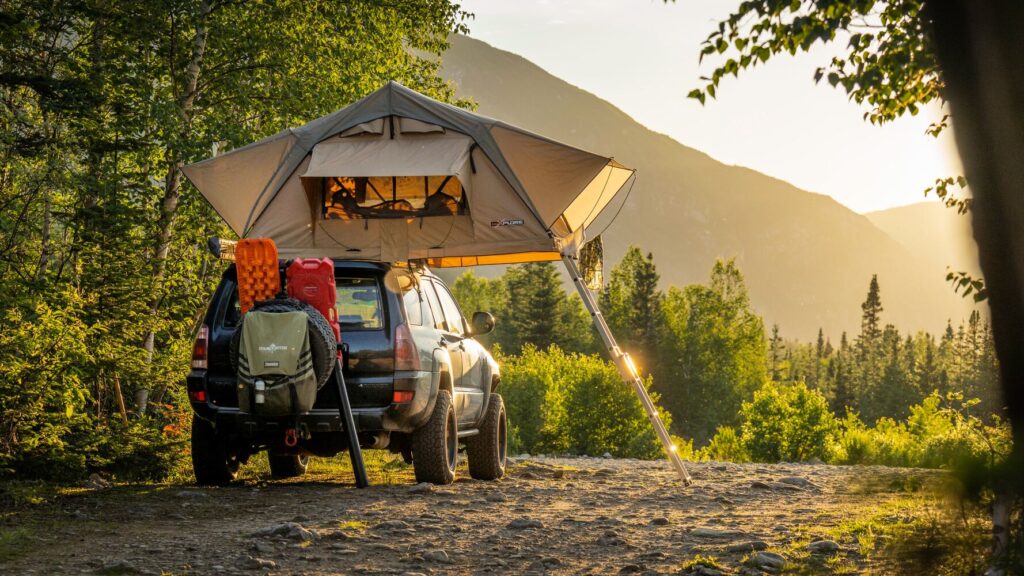
Evaluating Rooftop Tent Types
When classifying rooftop tents, we can categorize them based on several factors: shape, power source, material, opening mechanism, purpose or design, price range or features, weight, and size or capacity. Understanding these categories can assist you in making an informed decision based on your camping needs, vehicle type, and personal preferences. In the following sections, we will explore each of these categories, discussing the distinguishing features of the different types of rooftop tents within each one.

Rooftop Tent Types Categorized By Material
Rooftop tents are available in various materials, each offering unique advantages and characteristics. Let’s explore the different categories based on the materials used.
Hard Shell Rooftop Tents (ABS, Fiberglass, Aluminum)
Hard Shell Rooftop Tents are known for their durability and weather resistance. Their rigid shell, typically made of materials like ABS or fiberglass or aluminum, sets them apart from other rooftop tents.
Pros: Hard Shell Tents are incredibly durable and easy to set up and take down, thanks to hydraulic or gas struts.
Cons: On the downside, they can be heavy, expensive, and may suffer from limited ventilation.
Origin: The first hard-shell rooftop tents appeared around the 1950s and were popularized by overland travelers in Africa and Australia.
Suitable Vehicles: Hard Shell Tents are ideal for heavy-duty vehicles, such as SUVs and trucks, capable of supporting their weight.
Soft Shell Rooftop Tents (Rip-stop canvas)
Soft Shell Rooftop Tents are versatile and lightweight, making them a popular choice among campers. Made from flexible materials like canvas, nylon, or polyester, they can be easily set up and taken down.
Pros: They are lighter, more compact, and often more affordable than Hard Shell Tents.
Cons: Soft Shell Tents may not be as durable or weather-resistant and can be less secure.
Origin: Soft Shell Rooftop Tents have been around for decades, with the first models introduced in the mid-20th century.
Suitable Vehicles: Given their lighter weight, Soft Shell Tents can be used with a variety of vehicles, including smaller cars, SUVs, and trucks.
Hybrid Rooftop Tents
Hybrid rooftop tents merge the benefits of hardshell and softshell tents, offering the durability of a hardshell top with the space and affordability of a softshell design.
Pros: Hybrid rooftop tents provide an excellent balance between durability, weather resistance, and living space. They typically feature a hardshell top for easy setup and weather resistance, combined with a fold-out design to maximize space.
Cons: These tents can be more expensive than either hardshell or softshell tents. The setup can also be more complex due to the combined features.
Origin: Hybrid rooftop tents emerged in the early 21st century, responding to demand for more spacious, durable, and convenient camping solutions.
Suitable Vehicles: Hybrid rooftop tents are suitable for a range of vehicles but are ideally suited for larger, more robust vehicles that can handle the extra weight and setup complexity.
Rooftop Tent Types Categorized By Opening Mechanism
Rooftop tents come with different opening mechanisms that determine how they unfold and set up. Let’s explore the various categories based on their opening mechanism.
Pop-Up Rooftop Tents


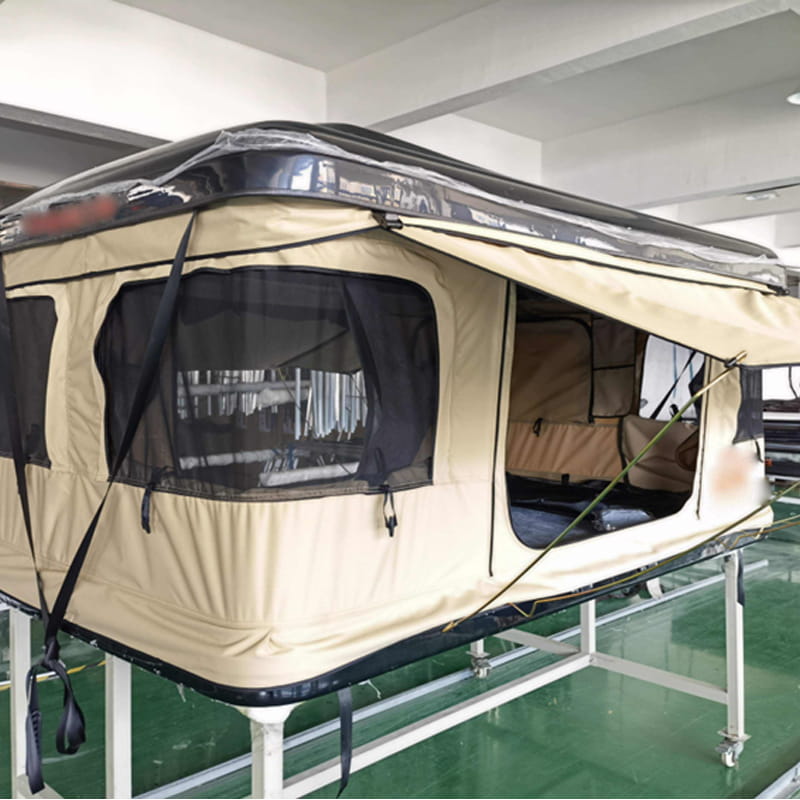
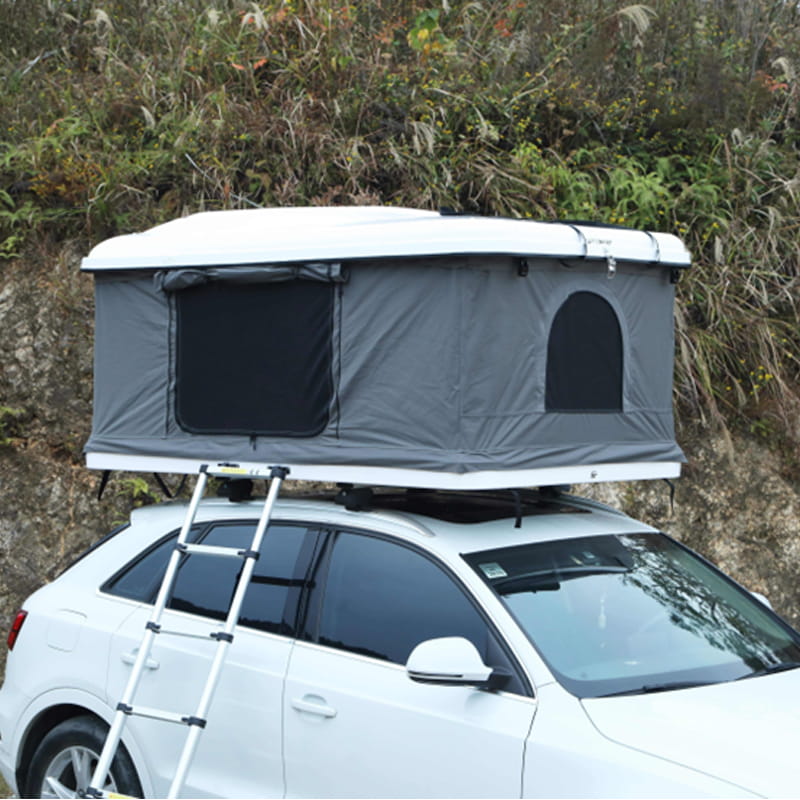
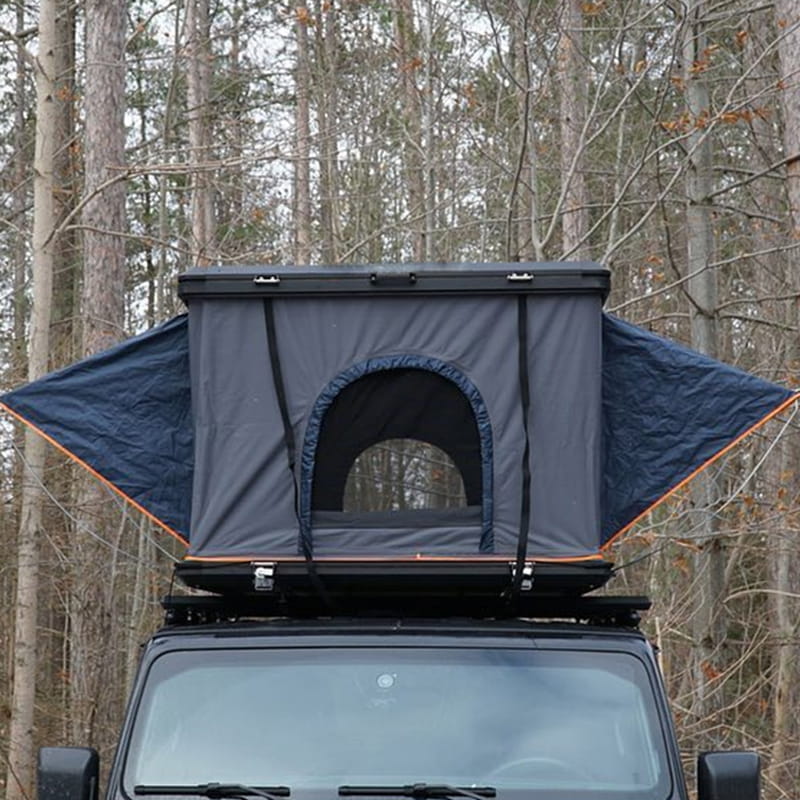

Pop-up rooftop tents are a specific type of hardshell rooftop tent that utilize a hinged design, allowing them to be erected almost instantly, hence their name.
Pros: Pop-up rooftop tents provide the quickest setup times of all rooftop tents, often just needing a single push to erect. They also offer superior protection against harsh weather due to their hardshell design.
Cons: These tents are often heavier due to the robust mechanism required for the pop-up feature. They are also usually among the most expensive rooftop tent options.
Origin: Pop-up rooftop tents have been around since the late 20th century, following the introduction of hardshell tents, with advancements in technology and design driving their popularity.
Suitable Vehicles: Like other hardshell tents, pop-up rooftop tents are best suited for heavier-duty vehicles that can handle the additional weight, such as SUVs and trucks.
Clamshell Rooftop Tents
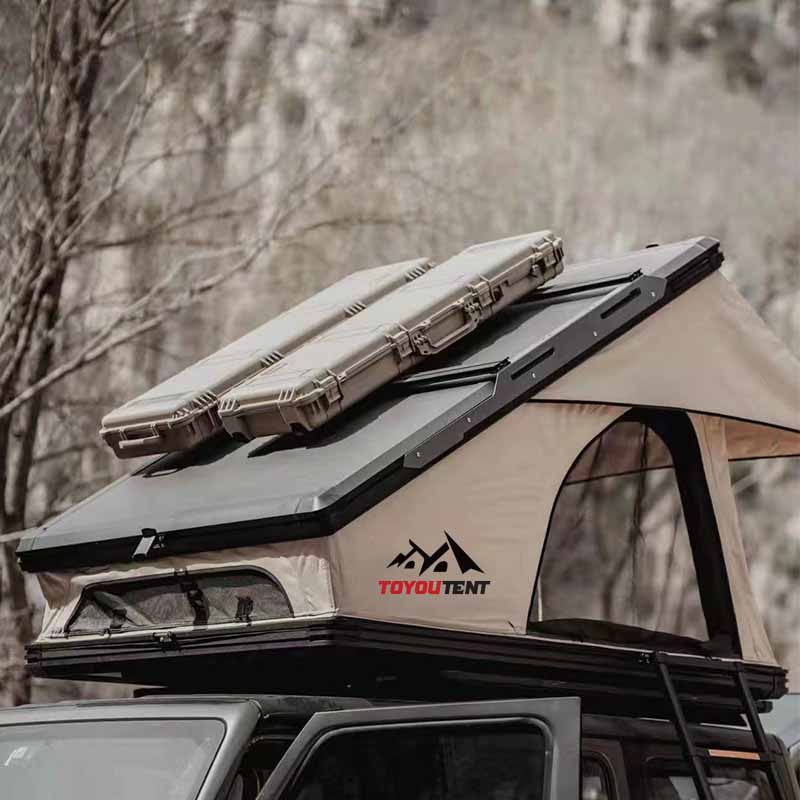
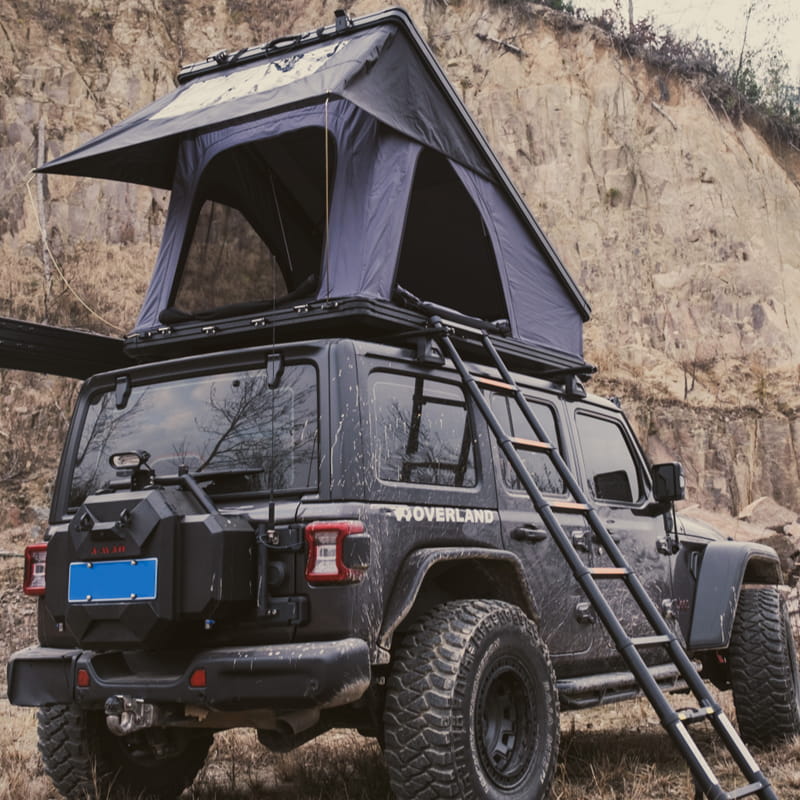
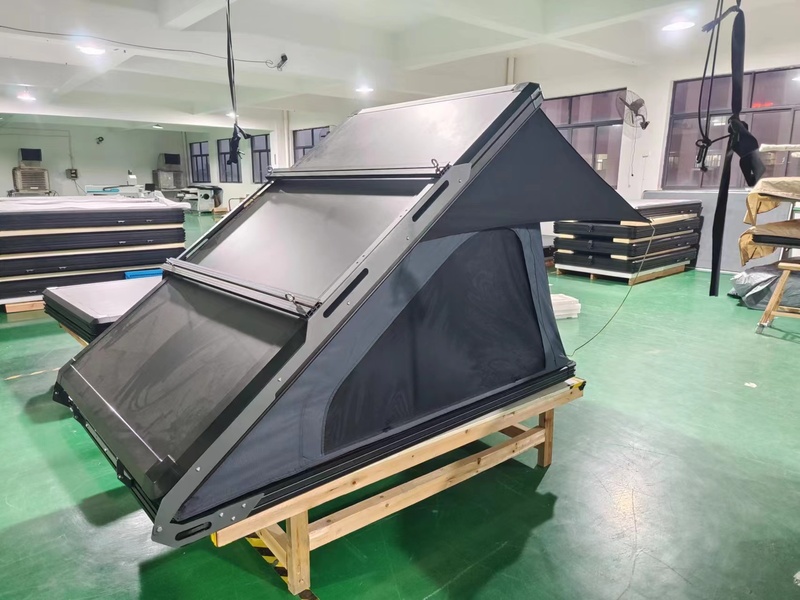



Clamshell rooftop tents are a subcategory of hardshell rooftop tents, characterized by their distinct shape and opening mechanism which is akin to a clamshell.
Pros: These tents offer robust protection and are extremely aerodynamic, reducing fuel consumption. The unique design also allows for a larger interior space than standard hardshell tents.
Cons: Clamshell rooftop tents can be among the most expensive options due to their complex design and sturdy construction. They are also typically heavier than other rooftop tent styles.
Origin: Similar to other hardshell tents, clamshell rooftop tents emerged in the late 20th century as a more rugged, spacious option for avid campers.
Suitable Vehicles: Due to their weight, clamshell rooftop tents are best suited to heavier, more robust vehicles such as SUVs and trucks.
Fold-Out Rooftop Tents
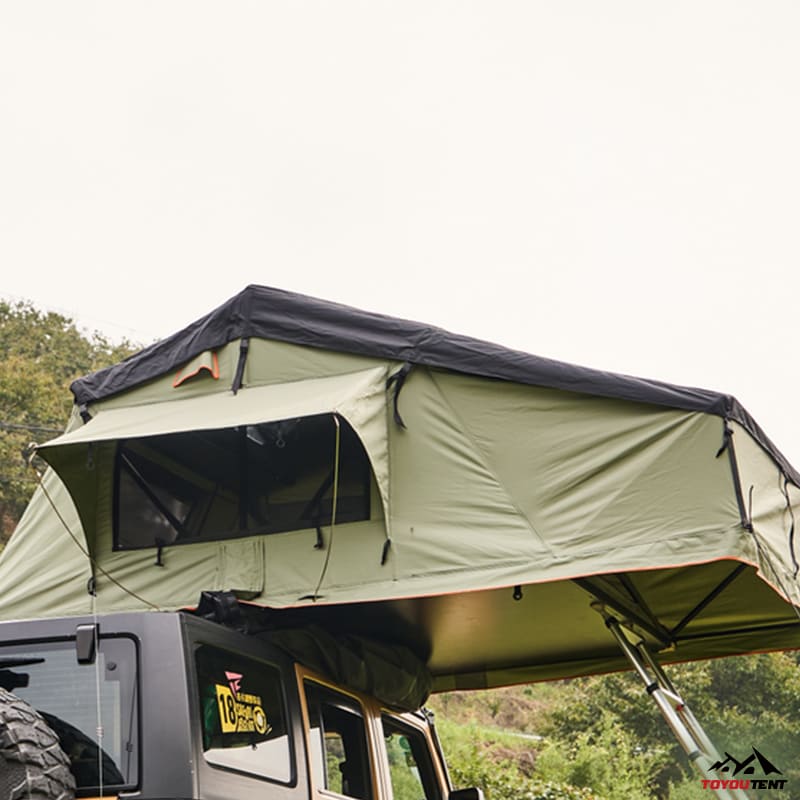
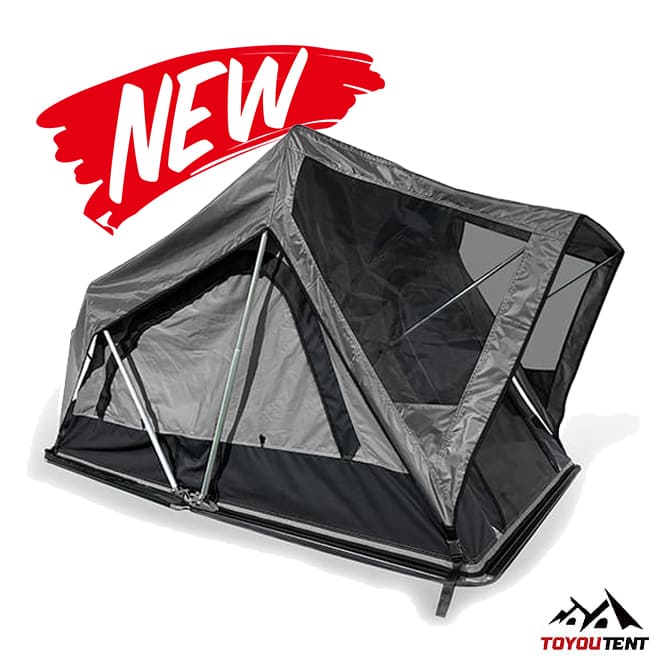

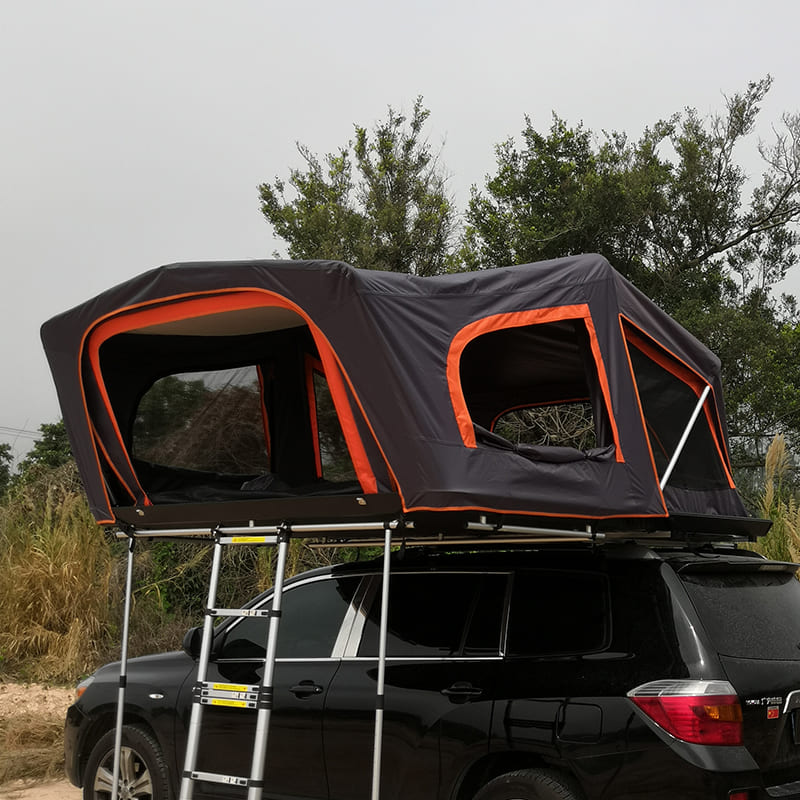
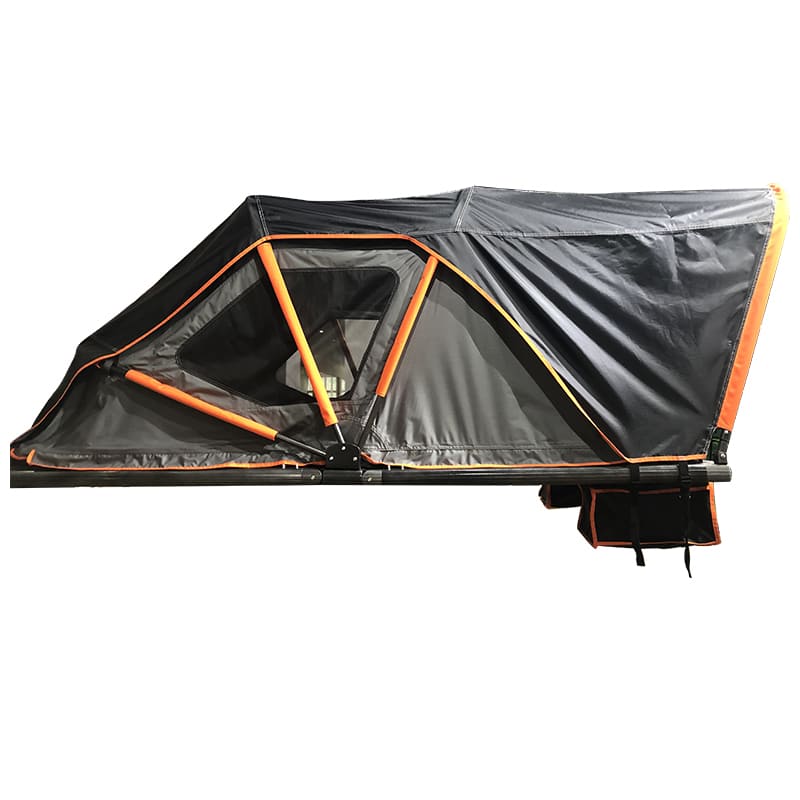



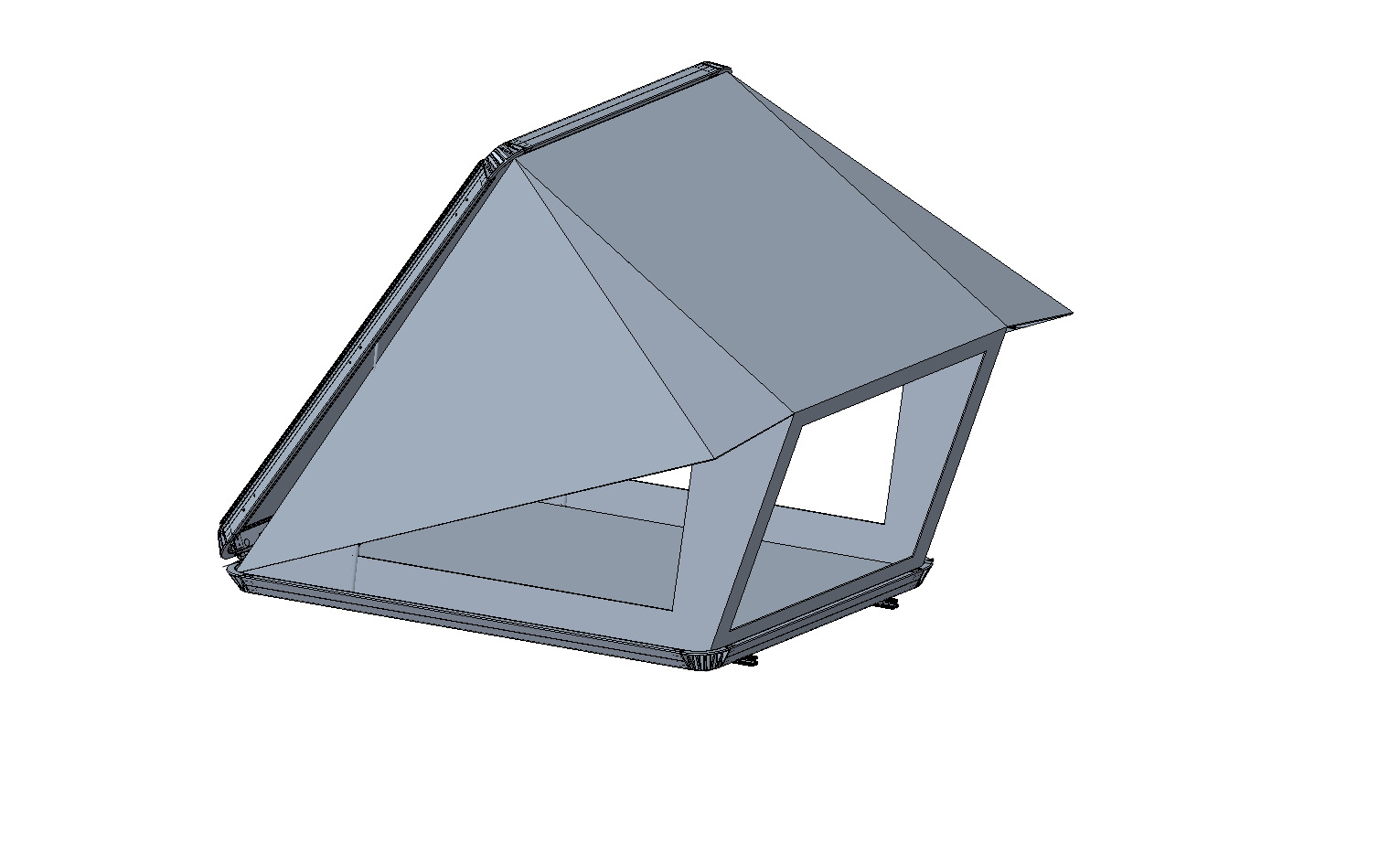

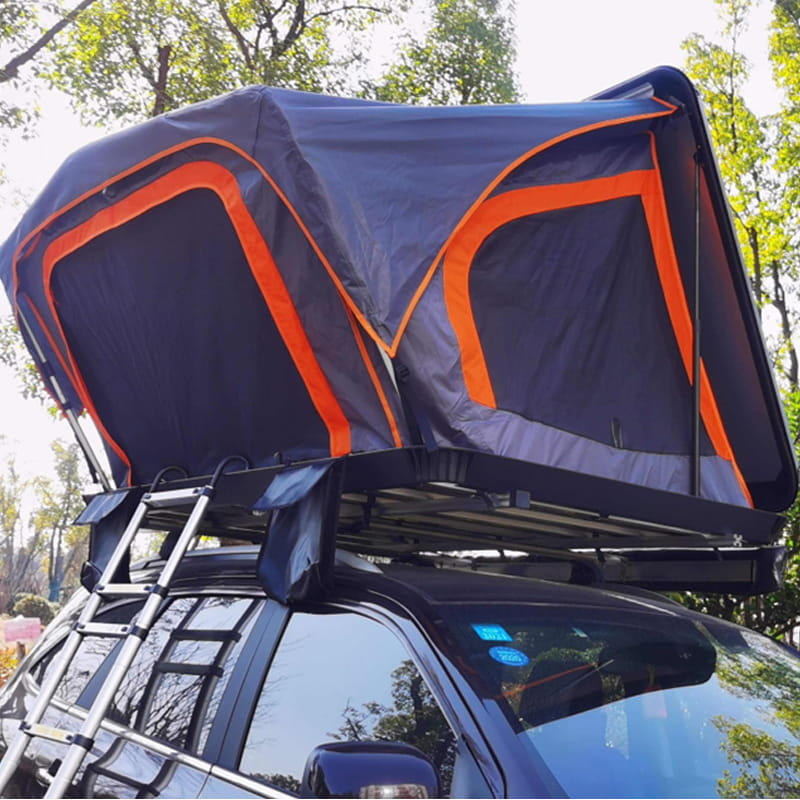
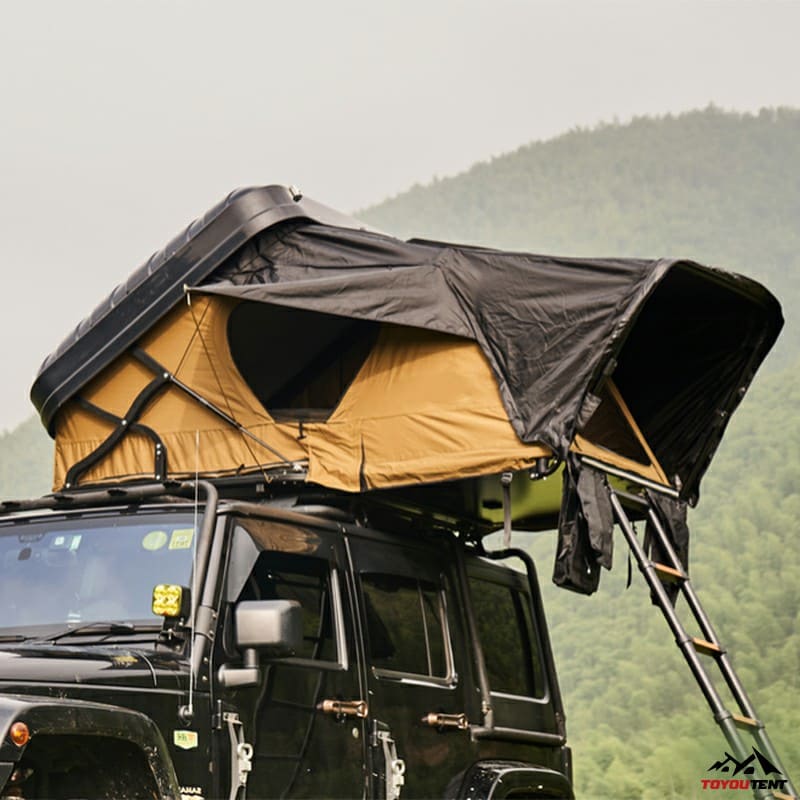
Fold-out rooftop tents are another variety of softshell rooftop tent. They differ from standard softshell tents in that they fold out horizontally from the vehicle, creating a larger sleeping area.
Pros: Fold-out rooftop tents offer an enormous sleeping area, making them ideal for families or groups. They’re also typically more affordable than hardshell tents.
Cons: These tents require more setup time than hardshell or pop-up tents, and they may be less resistant to harsh weather. Their size when unfolded could also limit the locations where you can camp.
Origin: Fold-out rooftop tents evolved from traditional softshell tents, being introduced in the late 20th century to provide more sleeping space.
Suitable Vehicles: Fold-out rooftop tents are suited to a variety of vehicles, though they work best on larger SUVs and trucks that can support the extended tent structure.
Rooftop Tent Types Categorized By Shape
Rooftop tents are available in different shapes, each offering unique advantages in terms of space, aerodynamics, and aesthetics. Let’s explore the various categories based on their shape.
A-Frame Rooftop Tents
A-Frame Rooftop Tents, resembling traditional ground tents, offer a perfect blend of familiar design and elevated camping experience.
Pros: They offer a spacious interior and easy setup, and are less susceptible to wind compared to other types.
Cons: Their larger profile can increase drag, reducing the vehicle’s fuel efficiency.
Origin: The A-Frame design has been a staple in the camping world for many years, and its adaptation to rooftop tents is relatively recent.
Suitable Vehicles: A-Frame Tents can be mounted on a wide range of vehicles, including compact cars, SUVs, and trucks, thanks to their moderate weight and size.
Wedge Rooftop Tents
Wedge rooftop tents are another style of hardshell rooftop tents, distinguishable by their sloping “wedge” design.
Pros: These tents are known for their aerodynamics, making them more fuel-efficient during transit. They’re also easy to set up, with a simple lift of the lighter end.
Cons: Wedge rooftop tents often have less headroom compared to other styles due to the sloping design. They also tend to be more expensive due to the complex mechanism required for the unique shape.
Origin: Wedge rooftop tents were introduced in the early 21st century, in an attempt to improve the aerodynamics of hardshell tents for better fuel efficiency.
Suitable Vehicles: Wedge rooftop tents can be fitted on a variety of vehicles but are best for those who prioritize fuel efficiency, such as smaller SUVs and crossovers.
Rooftop Tent Types Categorized By Power Source
Understanding the power source or mechanism of your rooftop tent is crucial as it affects the tent’s ease of setup and usage. Let’s delve into manual and electric options.
Manual Rooftop Tents
Manual rooftop tents represent the traditional design where the user physically sets up and takes down the tent.
Pros: These tents are often less expensive and less prone to mechanical failure since they rely on simple physical mechanisms rather than motorized parts.
Cons: The setup and takedown process can require more time and effort, particularly for larger or more complex tent models.
Origin: Manual rooftop tents are the original style, dating back to the 1950s when rooftop tents first gained popularity.
Suitable Vehicles: Due to their lightweight nature, manual rooftop tents can be installed on a wide range of vehicles, from smaller cars to larger SUVs and trucks, provided the roof can support the weight of the tent.
Electric/Automatic Rooftop Tents
Electric or automatic rooftop tents, on the other hand, utilize motorized mechanisms to assist in the setup and takedown process, making it a quicker and less physically demanding task.
Pros: These tents offer significant convenience, especially for those who might struggle with the physical demands of setting up a manual rooftop tent.
Cons: Electric rooftop tents can be more expensive due to the added technology. They also depend on a power source and are potentially more prone to mechanical issues.
Origin: Electric rooftop tents are a more recent innovation, appearing with the progression of technology and growing demand for convenience in the 21st century.
Suitable Vehicles: Due to the added weight of the motor and associated mechanisms, electric rooftop tents are typically more suited to larger, more robust vehicles like SUVs and trucks.
Rooftop Tent Types Categorized By Weight
The weight of a rooftop tent significantly affects its portability, vehicle compatibility, and setup process. Tents can generally be categorized into lightweight, standard weight, and heavy-duty based on their heft and construction.
Lightweight Rooftop Tents

Lightweight rooftop tents, generally weighing between 80-120 lbs (36-54 kg), are designed with ease of transport and setup in mind.
Pros: These tents are easy to mount and unmount due to their low weight. They also exert less stress on the vehicle and its fuel efficiency.
Cons: Lightweight tents may not offer the same level of durability or insulation as heavier models, and they might be more susceptible to damage from harsh weather conditions.
Origin: Lightweight rooftop tents have emerged with advances in material technology that allows for durable construction without adding excessive weight.
Suitable Vehicles: Due to their lighter weight, these tents can be mounted on a wide variety of vehicles, including smaller cars, crossovers, and SUVs.
Standard Weight Rooftop Tents
Standard weight rooftop tents, weighing in the range of 120-160 lbs (54-72 kg), provide a balance between portability and durability, offering more robust construction than lightweight models.
Pros: These tents offer solid durability and typically have better insulation and weather resistance than their lightweight counterparts.
Cons: They are heavier than lightweight models, which can impact vehicle handling and fuel efficiency. They also require a vehicle with suitable roof load capacity.
Origin: Standard weight rooftop tents represent the traditional weight range for rooftop tents, optimized for a balance of durability and manageability.
Suitable Vehicles: Standard weight rooftop tents can be used with a range of vehicles, typically from compact SUVs to larger trucks, depending on the specific weight of the tent and the vehicle’s roof load capacity.
Heavy-Duty Rooftop Tents
Heavy-duty rooftop tents, typically weighing over 160 lbs (72 kg), are built for extreme durability and often come with additional features for comfort and convenience.
Pros: These tents are typically the most robust and durable, equipped to handle harsh conditions. They often include advanced features and offer superior insulation and weather resistance.
Cons: The main drawback is their significant weight, which can impact vehicle handling, fuel efficiency, and setup time. They also require a vehicle with a high roof load capacity.
Origin: Heavy-duty rooftop tents evolved to meet the needs of overlanders and off-road adventurers requiring highly durable and feature-rich accommodation for their expeditions.
Suitable Vehicles: Due to their weight, heavy-duty rooftop tents are most suited for larger, more robust vehicles like SUVs, trucks, or specially equipped off-road vehicles.
Rooftop Tent Types Categorized By Size/Capacity
The size or capacity of rooftop tents is often determined by the number of people it can comfortably accommodate. Tents are generally classified as small, medium, or large, according to their sleeping capacity.
Small Rooftop Tents (2-person)

Small rooftop tents typically have a sleeping capacity for two people.
Pros: These tents are often lightweight, easy to mount, and an excellent choice for solo campers or couples.
Cons: Their smaller size may be a limiting factor for those planning to camp with more people or desiring more comfort space.
Origin: Small rooftop tents have been part of the product range since the beginning of rooftop tent evolution, catering to solo travelers or couples.
Size Range: Typically, small rooftop tents are around 1.4m wide when open.
Suitable Vehicles: Given their compact size and lighter weight, small rooftop tents can be mounted on a wide range of vehicles, including compact cars, crossovers, and SUVs.
Medium Rooftop Tents (3-4 person)
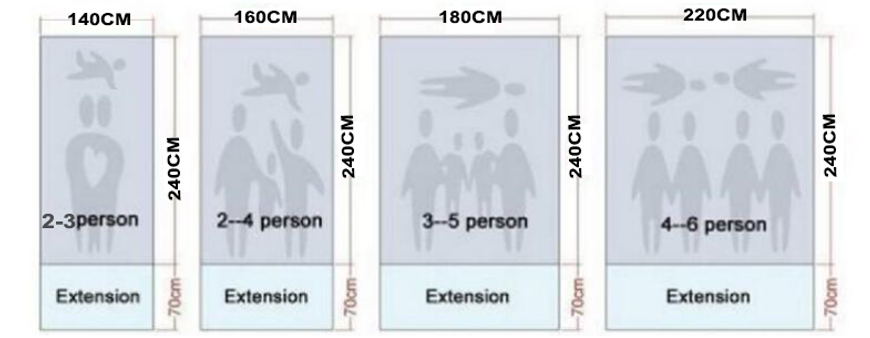
Medium rooftop tents can generally accommodate three to four people.
Pros: These tents offer a larger sleeping area and may include additional features like annex rooms for added space.
Cons: They are heavier and larger than small rooftop tents, requiring a more robust vehicle roof rack and potentially impacting vehicle performance.
Origin: Medium-sized rooftop tents came as a natural extension of the product range to cater to small families or groups of friends.
Size Range: Medium rooftop tents are usually around 1.6m wide when open.
Suitable Vehicles: Medium size tents are generally suited to larger vehicles with sturdy roof racks, such as SUVs, trucks, and vans.
Large Rooftop Tents (4+ person)
Large rooftop tents are designed to sleep four or more people, providing maximum space.
Pros: These tents offer spacious interiors and often come with additional features like extended canopies or annex rooms for added living space.
Cons: Due to their size and weight, large rooftop tents require a robust vehicle roof rack and can significantly impact vehicle performance and fuel efficiency.
Origin: Large rooftop tents were developed to cater to larger families or groups wanting to share a common sleeping and living space.
Size Range: Large rooftop tents are typically around 1.8m wide when open.
Suitable Vehicles: Large rooftop tents are typically suited for larger, more robust vehicles like SUVs, trucks, or specially equipped off-road vehicles.
Rooftop Tent Types Categorized By Seasons
Four-Season Rooftop Tents

Pros: Designed to withstand varying weather conditions all year round. They have features like insulated walls, a rainfly, and weather-resistant materials.
Cons: They can be more expensive than three-season tents due to their enhanced features. They might also be heavier due to the additional insulation and materials used.
Origin: The concept of four-season tents has been around for a long time in traditional camping, but it’s a more recent development in rooftop tents as they’ve evolved and improved over the years.
Suitable Vehicles: Given their potentially heavier weight, four-season rooftop tents are best suited for vehicles that can handle the extra load, such as SUVs and trucks.
Three-Season Rooftop Tents
Three-Season Tents are designed for use in spring, summer, and fall but are not suitable for winter camping.
Pros: Lighter and usually less expensive than four-season tents. They are designed with ample ventilation to keep you cool during warmer months.
Cons: Not suitable for winter camping or harsh weather conditions.
Origin: Like four-season tents, the concept of three-season tents has been a staple in traditional camping for many years and is a common choice in rooftop tents.
Suitable Vehicles: Three-Season Tents are typically lighter, making them suitable for a wider range of vehicles, including smaller cars as well as SUVs and trucks.
Two-Season Rooftop Tents
Two-Season Tents are designed for use in just the summer and spring seasons.
Pros: They are often the lightest and most affordable option, with plenty of ventilation for hot weather.
Cons: They are not designed to withstand heavy rain, wind, or cold temperatures.
Origin: Two-Season rooftop tents are less common but can still be found on the market, particularly in regions with mild climates.
Suitable Vehicles: Given their lighter weight, two-season rooftop tents can be suitable for a wide range of vehicles, from small cars to larger SUVs and trucks.
Rooftop Tent Types Categorized By Price Range/Features
The price range and features of rooftop tents are also significant factors that influence your purchasing decision. From budget to luxury options, there’s a rooftop tent to match every budget and camping requirement.
Budget Rooftop Tents
These are the most affordable rooftop tents, providing essential features at a lower price point.
Pros: Budget rooftop tents make rooftop camping more accessible to those on a tight budget. They usually offer all the essential features needed for a comfortable camping experience.
Cons: These tents might not have the durability, comfort, or additional features found in more expensive models. They are often designed with less expensive materials and may not withstand harsh weather conditions as effectively.
Origin: As rooftop tents grew more popular, budget options began to appear on the market to cater to cost-conscious campers.
Suitable Vehicles: Budget rooftop tents are usually lighter and can be used with a broad range of vehicles, including compact cars, SUVs, and trucks.
Mid-Range Rooftop Tents
Mid-range rooftop tents provide a balance between cost, features, and durability.
Pros: These tents often incorporate more durable materials and additional features compared to budget models, while still remaining reasonably priced.
Cons: While offering more features than budget tents, they may still lack the advanced features and ultra-durable construction found in premium or luxury models.
Origin: As the rooftop tent market diversified, mid-range options emerged to offer a balance between cost, comfort, and durability.
Suitable Vehicles: Given the variety in weight and size among mid-range tents, they can suit a wide range of vehicles, from small cars to larger SUVs and trucks.
Premium Rooftop Tents
Premium rooftop tents offer high-quality materials and features at a higher price point.
Pros: Premium tents often feature durable construction, high-quality materials, and additional features like enhanced weather resistance, extended lifespan, and comfort-enhancing extras.
Cons: These tents are more expensive, reflecting the higher quality of materials and features.
Origin: Premium rooftop tents have emerged in response to the demand for high-quality camping gear that offers superior comfort and durability.
Suitable Vehicles: Due to their heavier weight from the premium materials used, these tents are typically best suited for robust vehicles such as SUVs, trucks, or off-road vehicles.
Luxury Rooftop Tents
Luxury rooftop tents are at the pinnacle of the market, providing top-notch materials, advanced features, and often customizability.
Pros: These tents offer the ultimate comfort and convenience, with features like built-in mattresses, extended headroom, solar power compatibility, and even integrated electronics in some models.
Cons: Luxury rooftop tents are the most expensive on the market and may be considered an overkill for casual campers.
Origin: As technology advanced and the demand for high-end camping gear increased, luxury rooftop tents emerged on the market, offering unrivaled comfort and features.
Suitable Vehicles: Due to their size, weight, and often more complex installation, luxury rooftop tents are typically suited to larger, more robust vehicles like SUVs, trucks, or specially equipped off-road vehicles.
Rooftop Tent Types Categorized By Purpose/Design
The purpose or design of a rooftop tent primarily defines its features and usage. From camping series to adventure series and more, the purpose-specific design of each tent type accommodates different camping styles and requirements.
Camping Series Rooftop Tents

These tents are designed for general camping use, combining comfort, convenience, and practicality.
Pros: Camping series rooftop tents usually offer a balanced mix of features at a moderate price point.
Cons: They might not have the specialized features of other series, such as extreme weather resistance or rugged construction for off-road use.
Origin: Camping series rooftop tents are among the earliest types of rooftop tents, intended to provide a comfortable, off-ground alternative to traditional camping tents.
Suitable Vehicles: Camping series tents are typically lightweight and can be used with a broad range of vehicles, from compact cars to larger SUVs and trucks.
Adventure Series Rooftop Tents
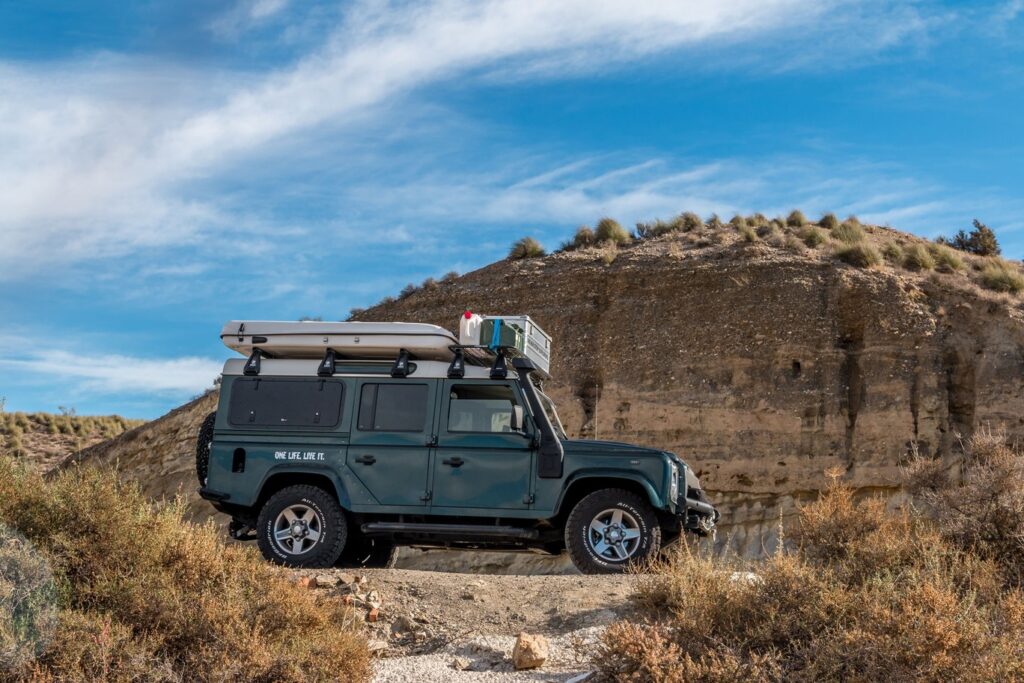
Adventure Series Tents are designed with more robust materials and features to withstand off-road and harsh environmental conditions.
Pros: These tents are often more durable and weather-resistant, equipped to handle challenging outdoor conditions.
Cons: Adventure Series Tents tend to be heavier and more expensive due to their enhanced features and rugged construction.
Origin: These tents emerged in response to the needs of overland adventurers and off-road enthusiasts, gaining popularity in the late 20th and early 21st century.
Suitable Vehicles: Due to their heavier weight, Adventure Series Tents are usually best suited for robust vehicles such as SUVs, trucks, or off-road vehicles.
Trailer Rooftop Tents
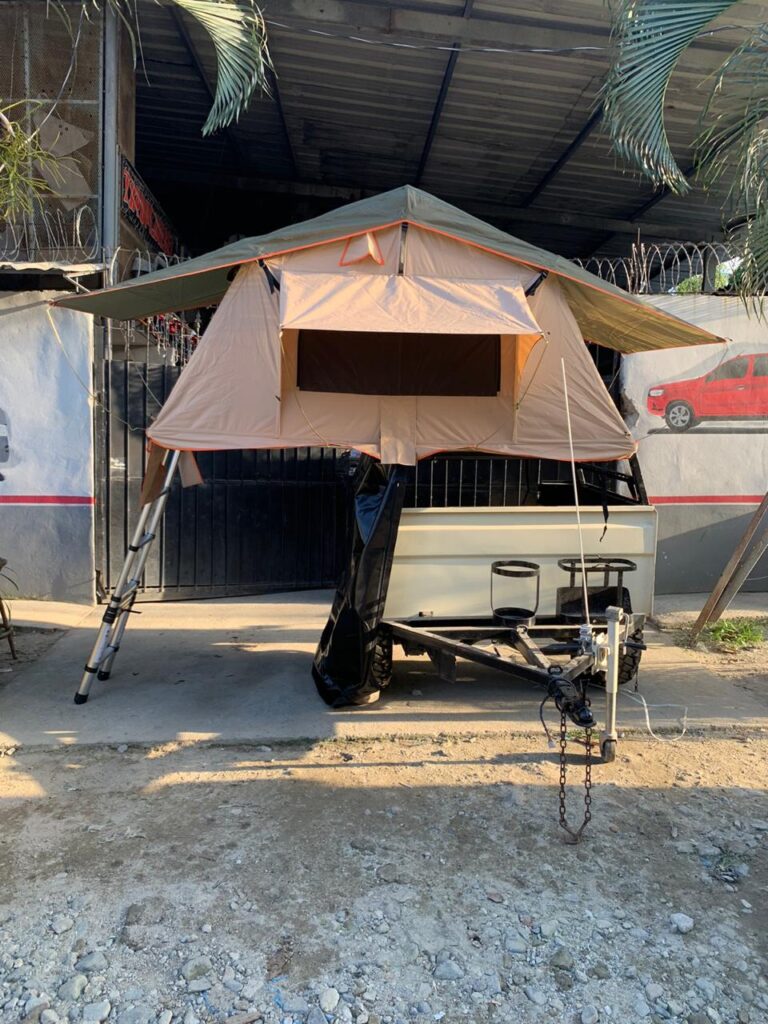
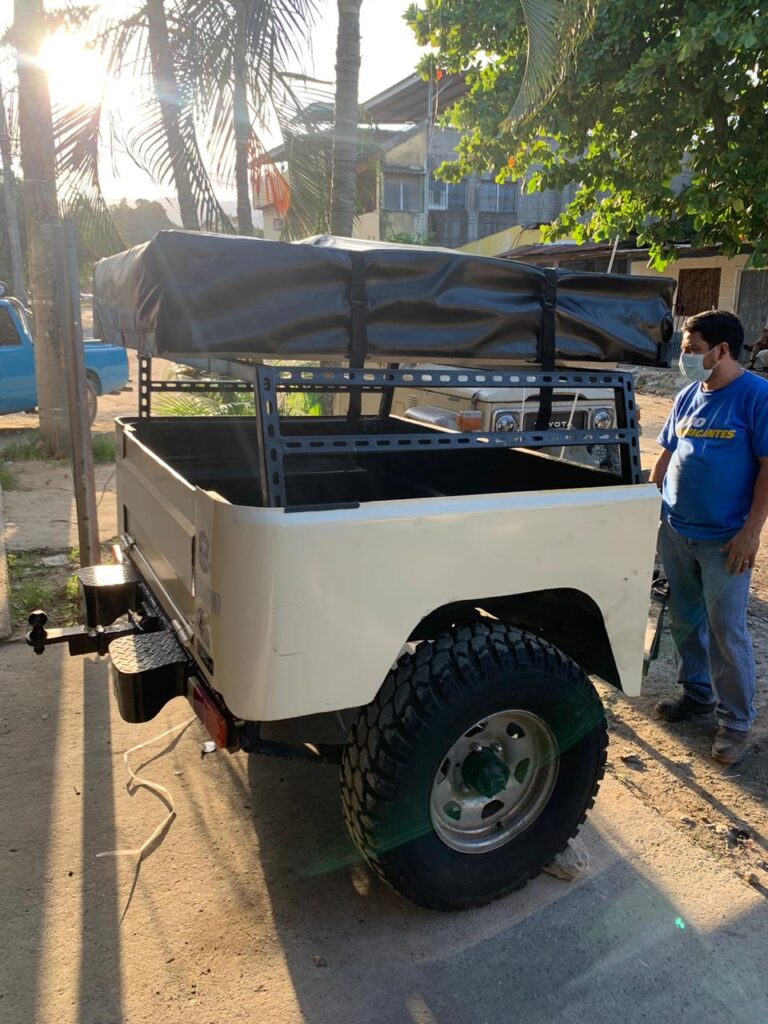
These tents are designed to be mounted on trailers rather than directly on the vehicle roof, offering the advantage of extra mobility and flexibility.
Pros: Trailer rooftop tents allow the vehicle to be used independently without needing to pack away the tent. They also provide additional space for camping gear or supplies.
Cons: These setups can be more expensive and require a compatible trailer.
Origin: As overlanding and camping grew more popular, the trailer rooftop tent concept emerged to offer more flexibility and space.
Suitable Vehicles: Any vehicle capable of towing the appropriate trailer can utilize a trailer rooftop tent, making it a versatile option.
Convertible Rooftop Tents
Convertible rooftop tents offer the ability to transform or expand the tent’s usable space, often including an annex or awning.
Pros: These tents offer versatility and added space for activities or additional campers.
Cons: Convertible tents can be more complex to set up and takedown due to their additional components. They may also be more expensive than simpler designs.
Origin: Convertible rooftop tents are a more recent innovation, offering added versatility to meet diverse camping needs.
Suitable Vehicles: Depending on their size and weight, convertible rooftop tents may be best suited for mid-size to larger vehicles, such as SUVs and trucks.
Truck Bed Rooftop Tents
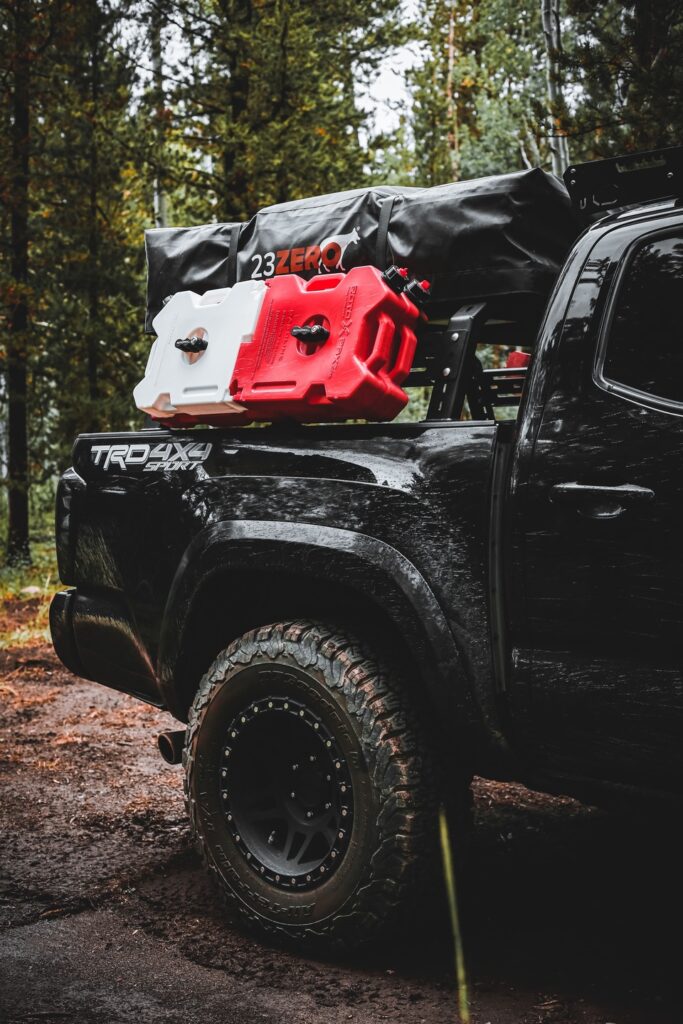
These tents are designed to be installed directly in the bed of a pickup truck.
Pros: They provide an elevated sleeping area while taking advantage of the truck bed’s space and structure. This setup leaves the vehicle’s roof free for other gear.
Cons: Obviously, these tents are limited to use with pickup trucks. They may also offer less protection from the elements compared to rooftop tents mounted above the vehicle.
Origin: Truck bed tents emerged as a solution for pickup owners, providing a comfortable sleeping area without needing a ground tent.
Suitable Vehicles: As their name suggests, truck bed rooftop tents are designed exclusively for pickup trucks.
Contact Us – ToyouTent – A Rooftop Tent Manufacturer
While there are many types of rooftop tents available, the best choice depends on your personal needs, your vehicle’s capabilities, and your budget. Be sure to consider all these factors before making a decision. Happy camping!
Remember, at ToyouTent, we understand the needs and preferences of our clients, and we are committed to providing high-quality roof top tents along with reliable after-sales service. We aim to address any concerns our clients may have, ensuring their satisfaction and enjoyment with our products. Whether you are an importer, distributor, or camping brand, we are here to fulfill your roof top tent requirements and make your camping experiences unforgettable.
Please kindly fill out the form below, and the ToyouTent team will be pleased to assist you in obtaining a quote promptly
Note: Your email information will be kept strictly confidential.





